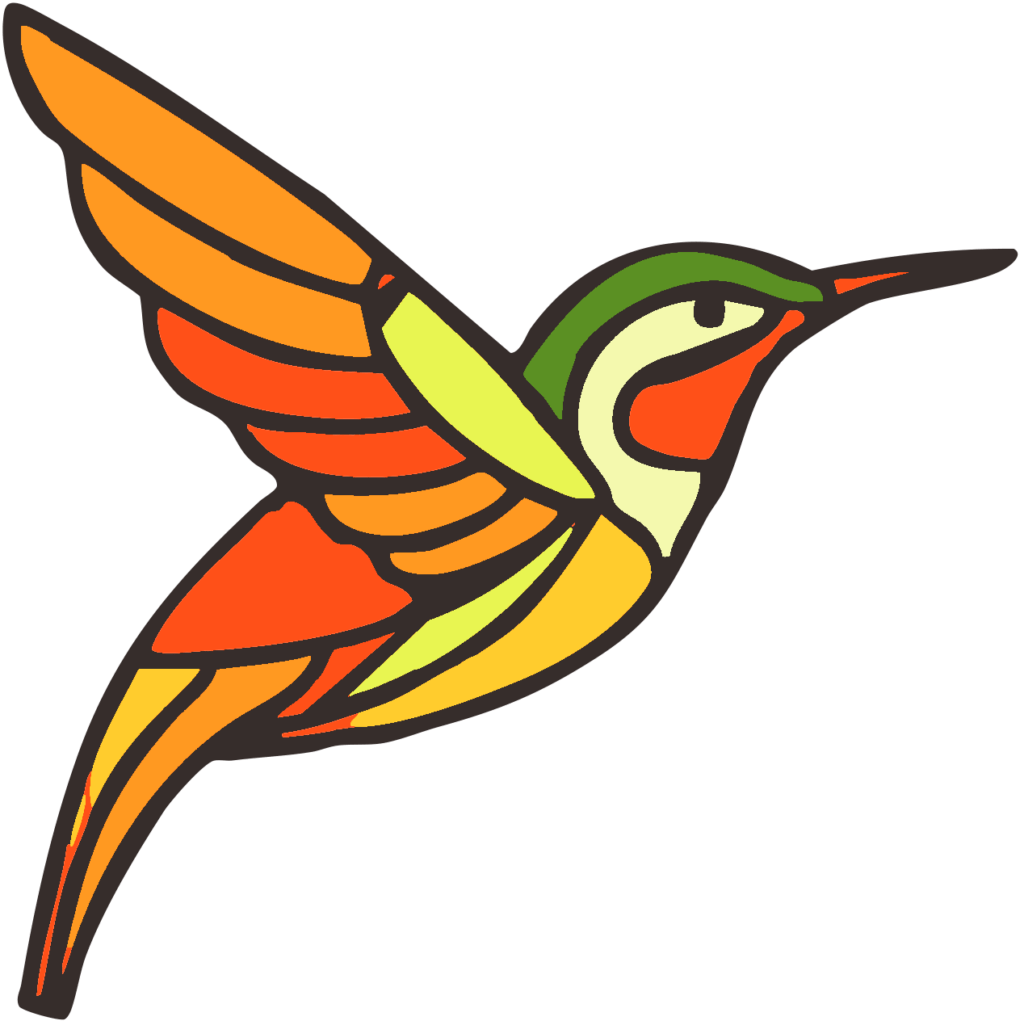[Strike A Chord] Alex Henry Foster – New Live Album “Standing Under Bright Lights”
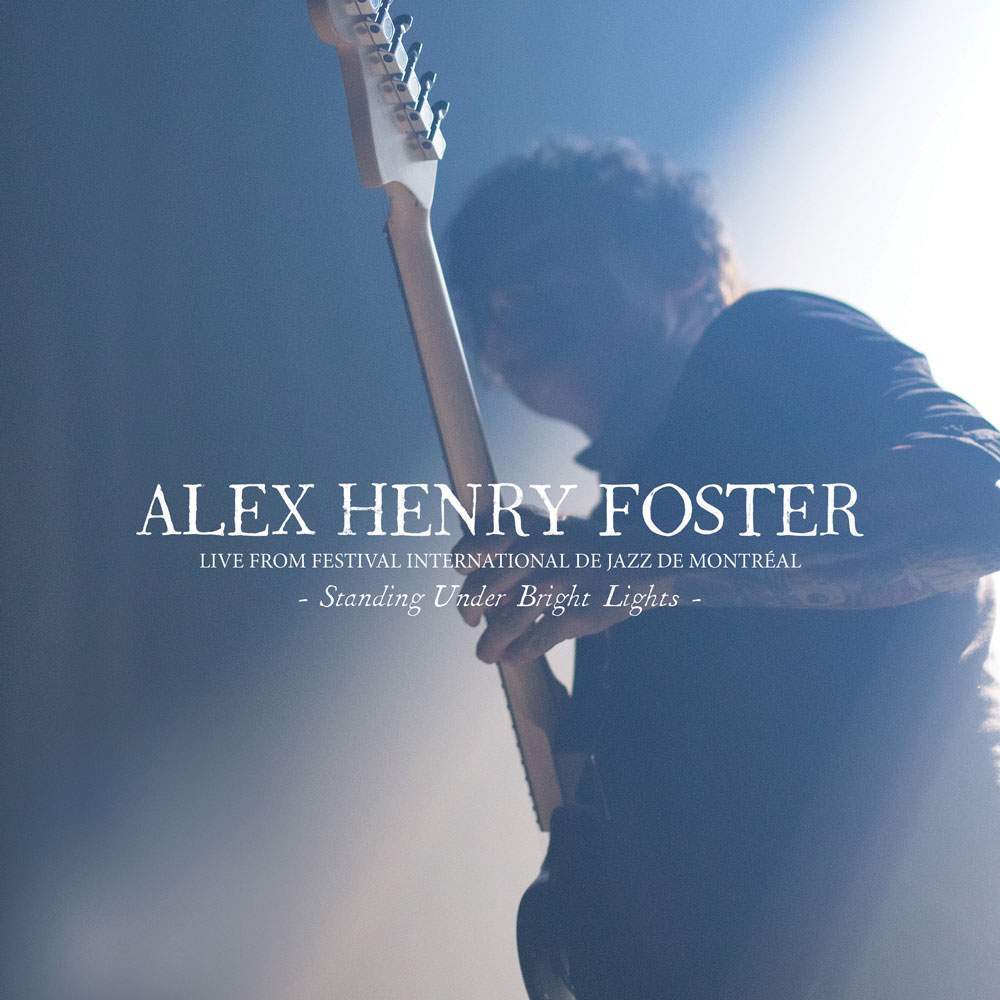
PUBLIÉ INITIALEMENT DANS Strike A Chord (en anglais seulement)
Lisez l’article original ici
Alex Henry Foster says « We all need that little ray of hope, no matter how bright or dim it will be… « .
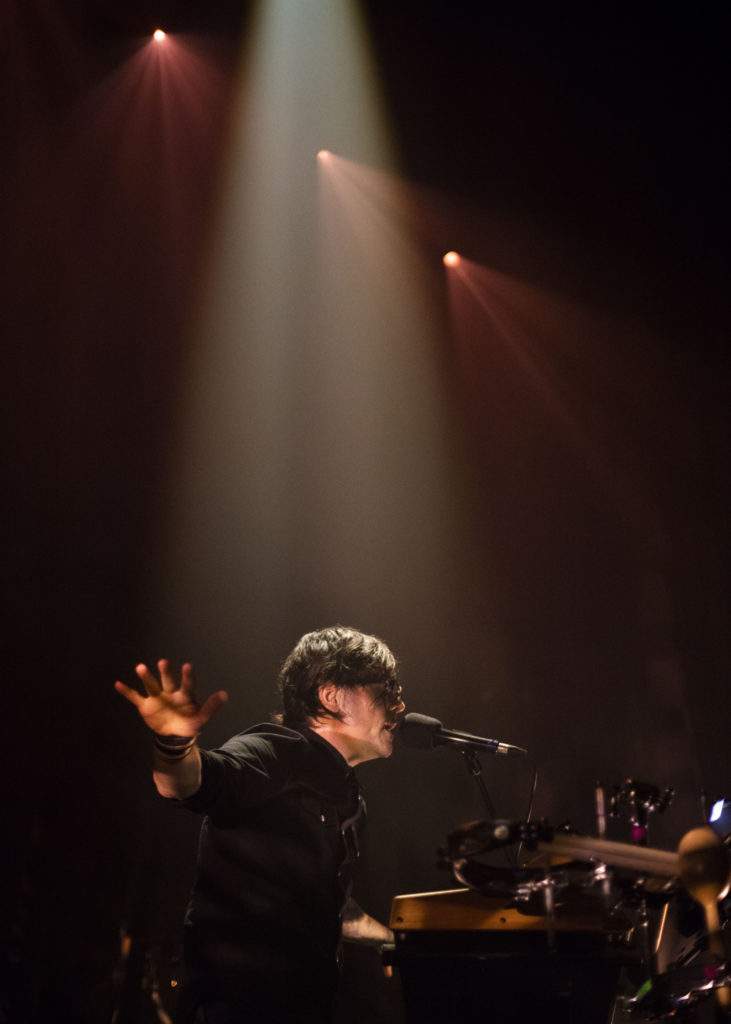
ー What meaning and feeling are put into your live album title, “Standing Under Bright Lights”?
For me, there’s no possible creative incarnation without having a title to begin with. Always. Every album, book, collaborative event, or any other art form I had the incredible privilege to see bloom, from a distant vision up to their fabulous transformation into define living entities, has always started with a title. It’s nothing but an elusive idea for me until I find this, which means that I will be completely obsessed by this initial process, a musing journey that could easily take months during which I extensively reflect on any instinctive words I feel I could potentially translate the emotions that have yet to be discerned and that haven’t been fully embodied at this point… It leads me to an affective breaking point every single time.
And until I find the title, I’m absolutely unable to commit to a project. But when I do find it, I am then deeply convinced not only of its unique character, but I also have a better understanding of the project’s purposes and ultimately of legitimacy. I believe that it is through that complete immersion in that irrational and compulsive self-searching obsession that any of those imaginary endeavors are unconsciously sparked to life within me, but also where they develop a singular identity and a vivid direction of their own, like a profound spiritual gestation and maturation of sorts.
In other words, those vibrant sensations awaiting to emerge slowly evolve way before I witness their nature once they’re out into the world. They are already expanding afore I even try and transform any of them into something else. And that’s the reasons why all of those entities can emancipate themselves beyond my personal insecurities and the doubts that define my confusing struggle behind what feels like the necessity to control their flowering evolution at any given moment, may it be from their intangible perception to my ambitious polishing intentions. Being honest with myself regarding that inner battle to keep holding on enables me to acknowledge the necessity of unconditionally letting go. I have to let those projects be as they please, otherwise, that process would only be self-torturing vanity.
That being said, it might be easier for people to understand the considerable time it took for me to discern if the moment to release that very special and pure musical journey was right, even if I had learned about the video and audio months earlier. It’s only when I saw the picture that would become the album artwork that it all made sense to me. If “Windows in the Sky” was an intimate voyage at the very end of my distressing introspection on grief, desperation, and hopelessness in order to find my way back to the luminous surface, that concert was the first instant I went from living in the darkness for an extensive period to suddenly finding myself into the light, dazzled and disoriented for a few minutes… until I needed to decide if I wanted to delicately open my eyes to see who I am rather than pretend for how I wanted others to perceive me.
And if you pay attention to those 2 album covers, “Windows in the Sky” and “Standing Under Bright Lights”, you can perceive that a veil has fallen, but still cannot precisely see who stands before you. One may stand under bright lights, but the transformative motion is underway, and we will keep discovering where that evolution may lead to when I’ll know what the title of my next project will be.
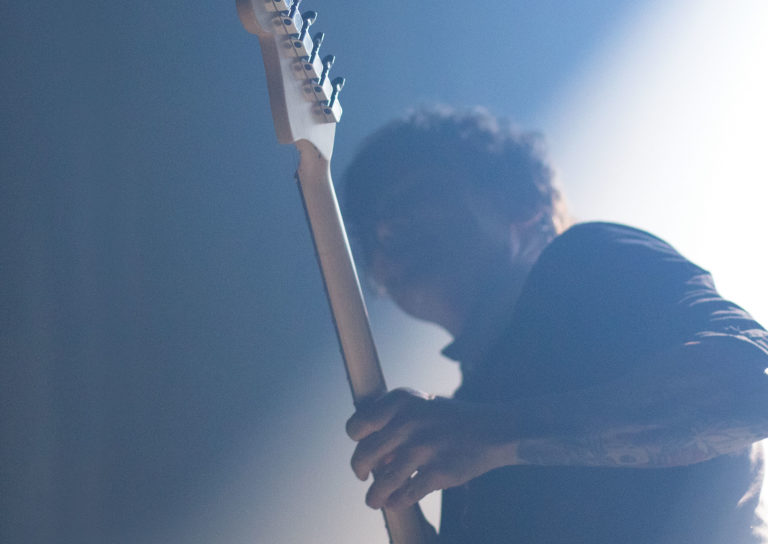
― We heard you recorded your works in your own studio, Upper Room Studio, which you remodelled from an old Catholic church with members of Your Favorite Enemies. Why did you choose the church as the place for the studio? Please tell us the story about your studio.
Like most bands, we started without any “career” ambitions. We were — and probably even more so now — friends who only wanted to spend as much time together as possible. Music was the common passion that allowed us not to collectively express our emotions, but also to assert some of the deepest personal pains we may have had.
So when it became more of a communal lifestyle for us, added to the fact that the neighbours were starting to call the police extensively, we knew it was time to look for a place of our own…
Our needs were greatly unconventional. We were a community of 20+ people at that time, there was the band, we had just started our own record label, had a weekly web show and were trying to envision ourselves 10 years ahead… So we were looking for a place to stay and create, large enough to lodge everyone, remote enough to avoid becoming a nuisance for others, that would offer the extra space for any of our activity to expand and for any new potential idea to be integrated as well. We most certainly spent several months looking for that specific type of place before finding the church we bought. We visited former schools, disaffected buildings, abandoned factories, and on, and on, and on… But nothing was close to what we needed or were looking for. We even started to entertain the idea of relocating our community abroad, and almost did it. And that’s when we had the idea to look for churches on sale.
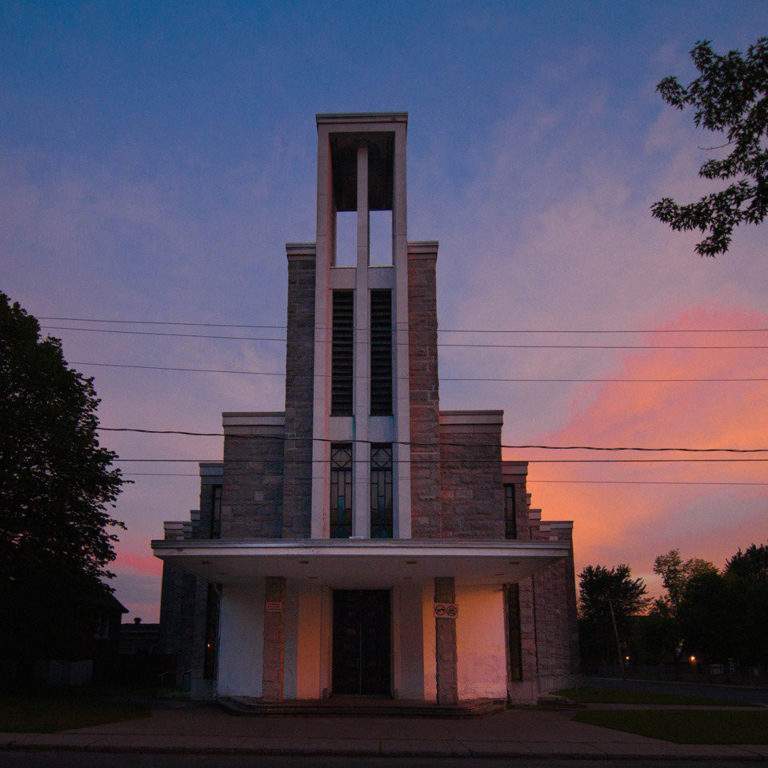
Catholicism had been really important in the province of Quebec since the foundation of Canada, but the recent years marked a significant diminution in the number of parishioners and therefore it became very expensive for the Catholic Church to keep administering the growing number of empty churches, which were being sold to private individuals or corporations. In our case, what was particularly interesting for us was the fact that they had to include the priest’s house in the deal in order to sell the church. We found our place a couple of weeks after we started looking in that direction. Once we found it, we went for a visit, convinced the authorities in place to sell us the property, but had to wait for a whole year before the transaction was completed, part of it due to the very extensive process established by the Church administrators after all sorts of post-sale catastrophes, like a former church becoming a strip club and another one being turned into a criminal bikers club. Let’s just say that the prospect of selling to a rock band wasn’t really promising either…
The other problem, which became a major issue for our plans, was that not bank wanted to finance the mortgage on a church. We managed to get the sum required at the very last moment. It was an all-in or all-out for us. That stretching decision sadly created the very first dissension and let to the eventual departures of some members of what had otherwise been a pretty tight community. And even if I’m still saddened by that split, looking back with a 10-year perspective reinforced the legitimacy of my decision to follow my instinct at that time.
It would take another year for the church-turned-studio to be fully operational, a period where we learned to paint, plaster, repair, renovate, and whatnot. This is also what explains the lack of musical projects released by Your Favorite Enemies over that incredibly formative time of personal and collective demolition, reconstruction, and creative reinvention, where our community was also reborn.
There’s so much more to say about that season, I could easily write a whole book about it all!
― You played the guitar with slide bar in the song, “Summertime Departures / Sometimes I Dream (Official live video).” In another song, the guitarist played the guitar by using the violin bow and the drummer played the drum with the unique roundish drumstick. We feel you are committed to every single tone in your songs. How did you create your songs?)
The emotional instinct is at the very center of my creations. Once I feel like I can discern just enough of the spiritual intangibilities that come with a total self-abandonment and complete emancipation of whatever absolute we may need to be freed from, then I know the sensations are real, unfettered from my creative ambitions or affective perspectives, and I dwell into the colorful stream of that magnificent motion like a daydream wind guiding my heart and mind a little deeper in an unknown fold of sensations where impermanence unfolds its wonders for a brief instant, offering me a closer glimpse of beauties that, once communed with sounds, are turned into an eternal uplift. I’m not interfering with their willingness to bloom way beyond myself… That is creation for me.
ーThe MV of “The Hunter (By the Seaside Window)” inspired by David Lynch is like a movie and it makes us feel as if we were there. Also, the song includes Japanese phrases. What is the significance of those Japanese phrases in the song? This MV is wonderful because it makes us wonder whether it is a part of a MV or it is a part of a movie. Please tell us any episode about making the MV.
The Japanese phrases represent the transformative whisper I would like to hear when I’ll depart or when I’ll evolve into a new emotional form. It’s a representation of the acceptance that knowing their meaning won’t offer any comfort to our enslaving desire to comprehend what needs to be felt to be set free…
The MV is a vision of our own self-feeding illusions and our innerbonding fears to face who we are, what we could have been, what we would like to be, what we longed for other people to see as we hide our bleakest secrets deep within ourselves…
The production is the masterful result of movie producer Jessy Nottola and his photography director accomplice Nicolas Adalbert, along with the brilliant and generous actors Matthieu Lemeunier and Solenne d’Arnoux de Fleury, who turned a very modest budget film into a dazzling make of art.
As for any anecdotical stories related to the movie production, think about filming in a small cabin lost in the middle of a remote nowhere forest, having to shoot people outside in freezing conditions, while having to capture feelings in the midst of a raging Canadian snowstorm. What could go wrong in such perfect production conditions, right?
ー You quoted “Song” (“The Weight of the World is Love”) by Allen Ginsberg, who was the leading figure of The Beat Generation, in « Shadows of Our Evening Tides. » Why did you use the quote of the poem in your song?
It truly came as a last-minute decision. For me, emotions are little pieces of moving imagery assembled in all sorts of discorded ways. It doesn’t have anything to do with what I may think they represent or what I would like to believe they may evoke to others. This is the unique nature of music, constantly evolving and screamingly transforming. And I couldn’t think of any more moving piece of poetry that would transcend that transfiguration perspective within every one of us willing to keep on growing beyond our very self…
ー We saw the official video of the live performance of “Winter Is Coming In”. The light falling on the stage was breathtakingly beautiful and impressive. The wonderful light and magnificent sound combination made us feel like we were watching a play. How did you direct and perform to create such a show?
By offering myself to the flowing emotions of the ongoing instant in a total self-abandonment, by letting the spirit of that very special night be completely defined through the unique nature of the ever changing, reshaping and metamorphosing essence of the feelings that kept on retransforming what was never mine to dictate the shape and form of, nor the pace or direction. This is why I believe it was such a pure moment, a true communion of hearts and souls.
ー We felt the feeling of struggle in your work, “Windows in the sky”, and felt it contains very personal feelings. For releasing this album as a live album, we heard you reinterpreted the songs. How different it is from the original work?
It’s an absolutely different living entity. Trying to reproduce “Windows in the Sky” live would have been as much of a ridiculously selfsufficient ambitious fiasco, as a lifeless and sterile demonstration of my ignorance towards the deeper meaning of the emotions of the album that were no longer mine alone. I’m so grateful I haven’t attempted to force myself into perverting the concert’s spirit with any of my insecurities, doubts, and reassuring needs that night… That’s why the concert is not only so highly significant for me, but why it has its own growing willingness to be free of transforming itself as it pleases, or to move and transform anyone welcoming its nature. And that is only possible now that I have stepped away from its unbounded journey.
ー We’ve heard that the live performance along with this live album is special for you. What live performance was on that day? What is live performance to you?
During my 12-year tenure fronting Your Favorite Enemies, live performances were unconscious self-inflicted torture made of a selfdestructive attempt to be free from my emotional anguish and misery. They were a silent scream for help turned into an entertaining spectacle. As of now, it’s a celebration of life and rebirth, an honest let go into something pure enough to heal even the deepest wounds, to offer solace to the grieving ones, a refuge for those in need of an instant to break the cycle of pain, an opportunity to lose the burden of having to be strong when I don’t even have the strength to pretend no more. It’s a communion, and we are all welcomed to define its nature.
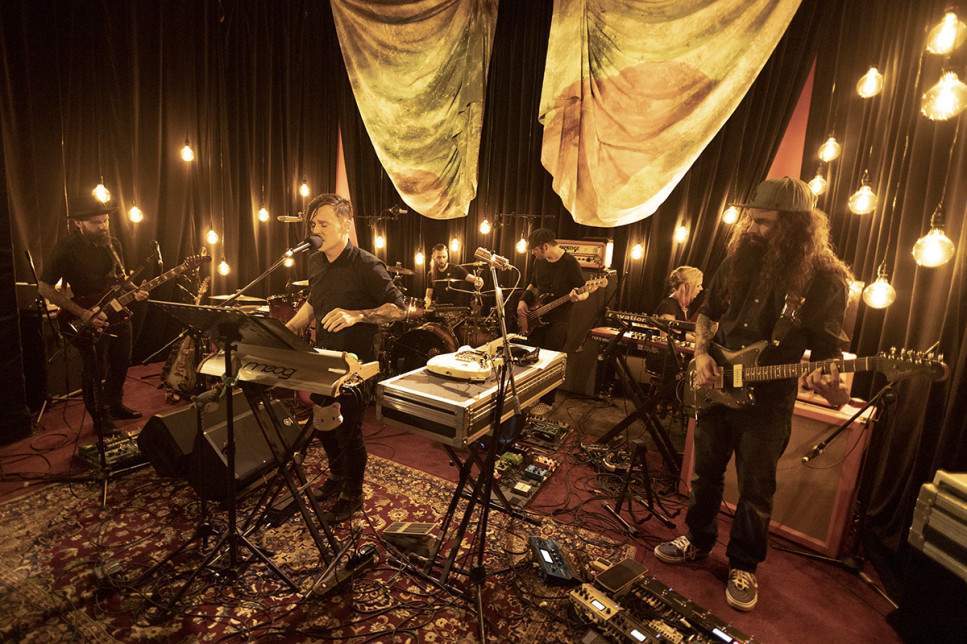
ー In the band, twin drums, twin guitars, twin synthesizers, and each instrument are played in pairs. What role does each of them play? And how do they complement or amplify each other?
So interesting! I had never realized that it offered a “twin pair” perspective, if not for the drums, obviously. Maybe it’s because it evolved so much since we played that first concert. It’s even more of an interesting constatation, as for me, there are no conscious patterns involved in anything I create. It’s instinctive and organic. Instruments need to serve the songs, always. They all have their particular colors, sometimes a bright one, sometimes subtle hues, but it’s the communal essence of those colors that reflects the simplest of all the complex human emotions. It’s the paradox, the counterparts, the complementarities, the oppositions, the contradictions that I’m interested in discovering through the invisibility of our spiritual psyche. The rest, for me, is just a set of successive chords and well-arranged melodies. And while I respect those who turned themselves into perfect pop-culture craftsmen and women, I’m only admirative of those who can move me from deep within, may it be an 11-piece noise orchestra or a stranger lightly humming beside me… It doesn’t matter, as long as it’s real.
ー Listening to your music and watching live performances make us feel as if we are conductors for orchestra and have a leading role in the play. The members are playing freely at first sight, but I felt like they were really controlled. How are they focusing on, playing together?
We all need to be completely absorbed in the moment, to be a part of it, to be it. And therefore, we can become a wave made of all different sorts of water, collapsing into each other, morphing into all various shapes and forms, but nonetheless part of the same motion, whatever it may be at any giving instant. That’s what I’m inviting the other musicians to be. Talent, for me, even if I’m blessed to stand along incredible musicians, is the ability to disappear for others to become the moment…
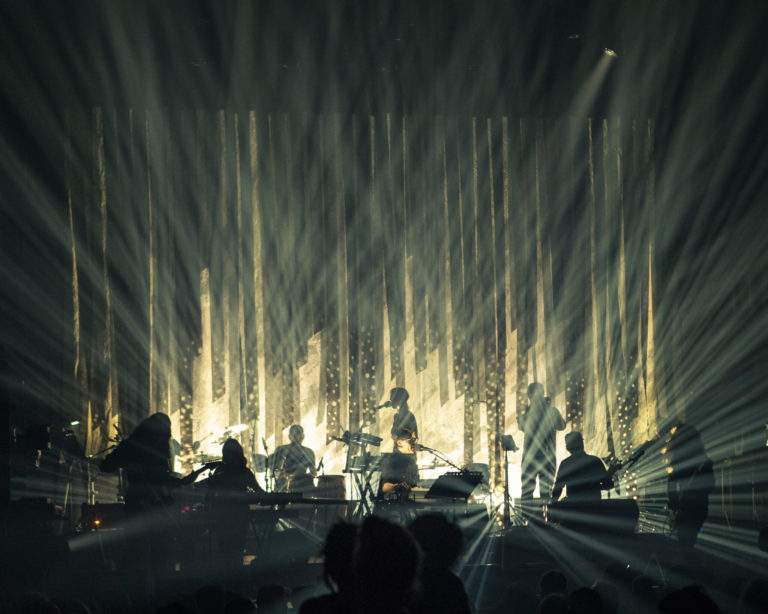
ー Having interviewed some bands that released their songs from their independent label, we feel that releasing songs from their own label is to show their attitude towards music and express what you want to do.
To be quite honest, to have my own record label doesn’t have much to do with a creative statement nor has it anything to do with my perspective on the corporate nature of the music business. It has a way more personal meaning to it, as it’s the representation of who I am as a person. I need to be free to do whatever I want, whenever I want, and no matter how I want to do it. I don’t think I would be able to be the product of anybody else’s vision or promotional plan. It’s not judgmental towards those who can play that game with so much perfection, but I wouldn’t be able, even if I wanted to try. It’s just not who I am… It sure would have greatly helped Your Favorite Enemies become a much more successful band had I agreed to sign with a major label, but would I be here answering your questions had I done it? Success, for me, is about integrity, and I’m trying to be as successful as I possibly can. The rest is only flickers, like egos are so easily inflated by flattery…
ー You released this live album from your independent label, “Hopeful Tragedy Records.” What does it mean for you to release an album from your own label in Canada? What made you do so?
For me, the sole perspective of having the opportunity to share one of my projects with others, no matter what type of creative endeavors it might be, is a very precious privilege that I absolutely never take for granted. Therefore having the possibility to do it on my own record label and publishing company adds an even more intimate dimension to that project, which means that I will not only be able to do it on my own terms and visions, but that I will also be in a position to personally give life to so many other elements associated with that project, that everything will be done in respect of just how precious people are to me. And that, beyond everything else, is the most important part of it all.
In that sense, it’s capital for me to have a creative “home” of my own, a place where the DIY communal spirit is a lifestyle and not only a work ethic. It’s family, which makes every vision possible, every connection deeper than any other amazing places I could be associated with. There’s no place like home, no more profound type of love than a giving one…
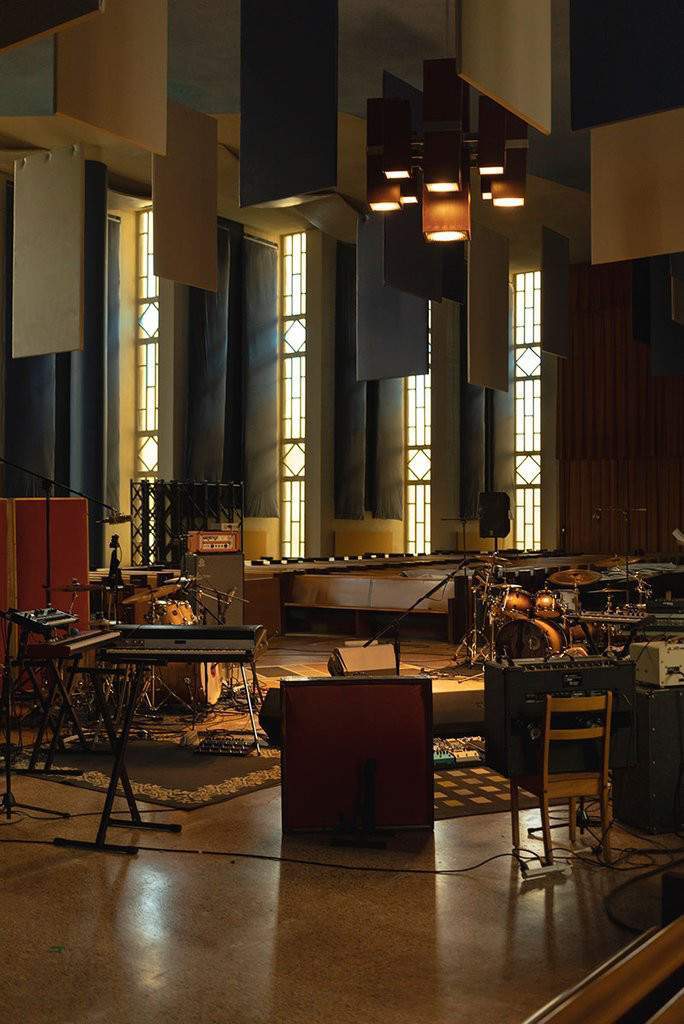
ー What is the present situation with the music scene in Canada under covid-19? What are you feeling now?
It’s horrifyingly terrible, like pretty much everywhere else in the world. A significant amount of venues of all sizes are closing, live crew members, booking agencies, press members, promoters, record stores, labels, and artists themselves have lost considerable assets hardly gained over the years and are now forced to find another career if they don’t want to lose the little they have courageously been able to save. The impact is larger than it seems; there’s a whole lot of other businesses that are affected by the present live industry collapse as well; restaurants, hotels, transportation companies, gear and space rentals, and on, and on, and on. There’s a whole lot of desperation amongst the members of our community right now. Hopefully, Canada has an economic support system, because I don’t think we would have been able to protect anything, even just a little, otherwise. It is crazy to think that it took decades for so many to build, yet now…
The silver lining remains how the music scene in The United States, where I reside now, will get back on track in the upcoming months. We all need that little ray of hope, no matter where it may come from and how bright or dim it will be…
All that to say, there’s a whole lot of other business sectors that have been either completely crushed or badly affected as well. It’s a global situation that requires global solutions. But for me, people’s health and security must come first, no matter just how much I would like to go back on the road. We need to protect people and cure them, but we also need to have compassion for those who have lost their loved ones, to welcome anyone feeling on the verge of an emotional breakdown. In other words, it’s time to individually decide what type of human beings we dedicate ourselves to be. That’s the only way to transform our environment, which will be incredibly impacting for our collective future once the crisis is over.
ー How would you like people to listen to this album?
I want people to feel truly welcomed to define and redefine what I deeply believe was a singular and unique moment, may they feel or not the vivid emotions and uplifting sensations that led me to be set free from so many insecurities and doubts that night. It’s not about me no more, it’s about crafting a journey of their own by following the spirit of that instant as far, as deep, and as long as they want. There’s so much more to discover, one let go at a time, and I hope I’ll have the fabulous privilege to know what people have found, so I can dwell even more into it afterward. It’s only a communion when you give everything you think you have away, even if you don’t have enough faith to think you might yourself receive something as well. And if I’m honest, I have already received so much that I’m grateful for the generous opportunity I have to be able to open up about it all. I just wish others will be as emancipated and blessed as I am.
ー How would you like to spend this year?
In serenity. I am a person who has the propensity to struggle with anxiety and with depression. After years of denying that reality of mine, I’m taking the time to invest in my affective and mental health, which is a major step forward for me. Even though it might be a daily challenge for the rest of my life, I now accept that reality and I’m willing to fight it. I know there’s no shame in being vulnerable and no disgrace in feeling too fragile to stand, now. I’ve learned that the most significant victories start on my knees, no matter how damaged I may feel. No one is ever too broken to be loved, and I’m no longer praying to be “fixed”. Rather than longing for healing, my acceptance now sets me free, and I can envision the countless opportunities that I now allow myself to be, as I am, not as I thought I should be.
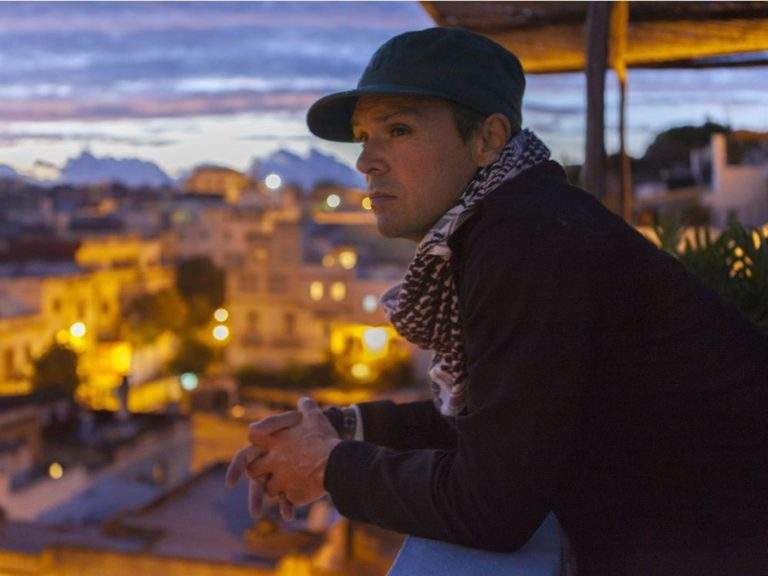
STRIKE A CHORD
13 juin 2021
